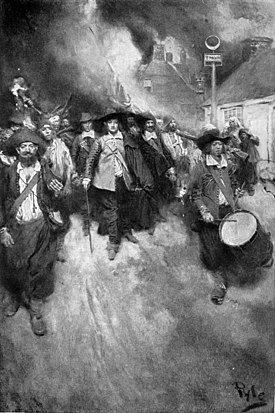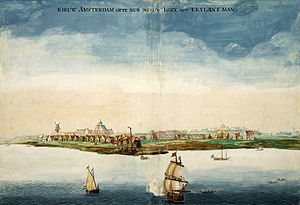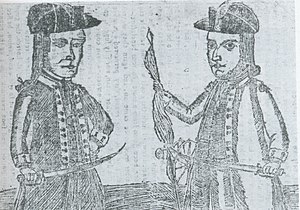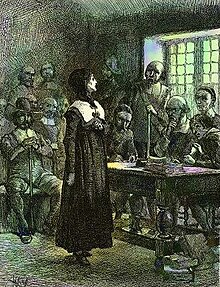|
Part
One The Early
Colonial Period #2 1619 Began Representative Democracy and Slavery The Jamestown colony had floundered until 1611 when tobacco was introduced to meet growing European demand. Crops were worked by indentured servants. In 1619 Jamestown decided to be governed by a representative democracy. Also two groups of slaves arrived and they were quickly integrated into the economy. The number of slaves grew very slowly and their treatment was much like that of local indentured servants. By the 1660's freed and existing slaves were becoming numerous enough to be competition for non-slave poor workers. They were also creating other domestic problems making large planters unhappy. This anxiety resulted in laws which removed freedoms from both existing and new slaves. |
A 1662 Virginia law made children of enslaved
women and white father a slave whereas they had been free.
Bacon's
Rebellion of 1766 was caused by poor landowning
recently freed indentured servants and freed slaves paying
taxes to
faraway Jamestown. They also formed an army to solve their problems. Issues
between Bacon's army and Jamestown developed. Eventually about
1,000 rebels chased the Governor out of the capital. "Government
forces from England arrived soon after and spent several
years defeating pockets of resistance and reforming the colonial
government to one more directly under royal control." Slaves
had once been more expensive but fear of rebellions by indentured
servants added to the cost of hiring white and slaves thus became a cheaper
source of farm labor.
|
The Burning of Jamestown by Howard Pyle 1905. Click to enlarge and view a slide show. Click on Most Pictures to Enlarge. Editor's Note: Our Democracy has been built over 400 and isn't finished. Criticizing today's fledgling democracy seems a bit hypercritical. |
 |
|
#3 Freedom of Religion Began in 1636 When Massachusetts Expelled Roger Williams Roger Williams immigrated from England to Boston in 1631. He refused preaching/teacher work because as a Separatist he did not agree with Boston's less radical Puritans. He left for more Separatist oriented Salem caused Puritans unhappiness. He soon moved to Separatist Plymouth where he got along with the people and studied the Indian behavior. Eventually he preached ideas too unconventional for Plymouth and by 1633 he was back in Salem. Roger Williams preached separatism, denounce as blasphemous the King's claim to Indian land, denounced the Bay Colony's loyalty oath as sacrilegious and he denied the right of civil authority to punish violation of the first five commandments. They related to idolatry, Sabbath-breaking, profanity, dishonoring your parents, and blasphemy. Eventually he was convicted of sedition and heresy. Order to leave Williams took his time but fear of imprisonment forced a quick winter departure where the cold didn't get him because he was helped by his Indian knowledge. In 1836 he and his followers founded Providence where they signed a pact allowing |
|
|
#4 All Immigrates Welcomed
by 1654 New Amsterdam
|
Anti-Semitic Governor Peter Stuyvesant wrote Holland asking to exclude them because they were poor and too dependent. The Jews wrote their successful business friends in Holland asking for support with the Dutch West Indies Company. The company decided they could stay as long as they were not a burden. This was a symbolic turning point because most countries restricted immigrants to maintain their cultural, ethnic, and religious identity. There would be four |
 great foreign
immigrants waves and while assimilation was not easy, immigrant
culture eventual became an important part of our culture.
Assimilation is one of many contentious
questions that began when during the Colonial period and continues today.
Pizza anyone? Click to enlarge and watch a slide show. great foreign
immigrants waves and while assimilation was not easy, immigrant
culture eventual became an important part of our culture.
Assimilation is one of many contentious
questions that began when during the Colonial period and continues today.
Pizza anyone? Click to enlarge and watch a slide show. |
|
# 6 Freedom of the Press Began with the 1735 Zenger Trial In late 1733 The New York Weekly Journal publisher Peter Zenger began printing opinions critical of the corrupt British colonial governor William Cosby. A late 1734 arrest order was executed. An inappropriately large bale was set. Zenger's lawyers did not pay as they wanted to stir up publicity against the Governor and his friendly judge. Eventually Zenger was charged with seditious liability. The law required the jury only determine if the defendant had perpetrated the material. Things didn't look good as when the judge dismissed Peter's two lawyers and replaced them with a governor friendly lawyer. The short trial was about to end when a star Philadelphia defense lawyer took over. He agreed that his client had published the material but |
 he told the
jury they should acquit because true statements could not be libellee. The jury acquitted. While no precedent was set what did begin was a belief that liberty required freedom of the press and speech. The trial would be publicized and
soon state governors began acting more responsibly. It would take decades to determine the exact legalities of freedom of the press
and speech.
President Adams would pass Alien and Sedition Acts to stop an
adversarial press. Only a few were prosecuted though some were jailed.
The law
was repealed under President Jefferson. Freedom of the press and
speech issues during difficult periods would
continue to haunt leaders. he told the
jury they should acquit because true statements could not be libellee. The jury acquitted. While no precedent was set what did begin was a belief that liberty required freedom of the press and speech. The trial would be publicized and
soon state governors began acting more responsibly. It would take decades to determine the exact legalities of freedom of the press
and speech.
President Adams would pass Alien and Sedition Acts to stop an
adversarial press. Only a few were prosecuted though some were jailed.
The law
was repealed under President Jefferson. Freedom of the press and
speech issues during difficult periods would
continue to haunt leaders. |
|
#
10. Shays'
1786
Tax Rebellion
Leads to a Constitution |
exestuation of militia who refused to follow orders. Soon the governor began to raised a privately financed state militia. This caused a severe reaction by farmer who saw a private army is the first step on the road to tyranny. The farmers raised their own army led by revolutionary war veteran and militia member Daniel Shay. Their main battle was to be a surprise attack at the federal Springfield arsenal. It didn't work. The armory was unexpectedly defended by militia men who were quickly dispersed. Four rebels were killed. They regrouped but the new Governor's privately financed army led by Benjamin Lincoln arrived and dispersed them with a surprise attack. That was it. Rebellion over. Eventually there was an amnesty based on signing of a loyalty oath. Twenty-one leaders were order hung but only two got the rope. The governor lost reelection and the new governor was more sympathetic to the farmers and he pardoned Shay and the other leaders. In Philadelphia those in Congress who feared the rebellion of citizens and resulting anarchy wanted a strong central government so the May of 1887 Philadelphia Constitutional Convention was called. By September a constitution was written. Ratification followed in July of 1788 and the Bill of Rights followed in 1791. The founders wrote what is now the world's oldest written constitution. France was writing her first constitution and she is now on her seventeenth and counting. |
 Contemporary depiction of
protest leaders
Daniel Shays (left) and
Job Shattuck.
Editors Note:
A tax and legal system was set up in
Massachusetts to benefit business. Difficult
economic times after the revolution caused by an
almost worthless Continental Currency caused
many farmers to lose property to Easterners.
See
2. So You Want a Revolution. Contemporary depiction of
protest leaders
Daniel Shays (left) and
Job Shattuck.
Editors Note:
A tax and legal system was set up in
Massachusetts to benefit business. Difficult
economic times after the revolution caused by an
almost worthless Continental Currency caused
many farmers to lose property to Easterners.
See
2. So You Want a Revolution. |
| Note: : textbooksfree.org summaries do little justice to the fascinating lectures available through Turning Points in American History audio course of E. T. O'Donnell |
PRESIDENTIAL
COURAGE1
Brave Leaders and How They Changed America
1789-1989 By Michael
Beschlos Fun Stuff Presidential Election Discussion Questions and Political Controversies examine poverty, middle income stagnation ... |
|
and
